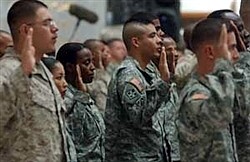Perspective: Immigrants use military service as path to citizenship
 Servicemembers recite the oath of citizenship at Al Faw Palace at Camp Victory, Iraq
Servicemembers recite the oath of citizenship at Al Faw Palace at Camp Victory, IraqThey come from Mexico, Nigeria, Afghanistan, Colombia, Cambodia and a hundred other countries across the globe to find the promise of America. Increasingly they enlist to fight, and sometimes die, in America's wars.
About 69,300 foreign-born men and women serve in the U.S. armed forces, roughly 5 percent of the total active-duty force, according to the most recent data. Of those, 43 percent – 29,800 – are not U.S. citizens. The Pentagon says more than 100 immigrant soldiers have died in combat in Iraq and Afghanistan.
In the wake of the Sept. 11, 2001, attacks, President Bush and Congress, citing long-established wartime powers, streamlined the process by which immigrants in the armed forces could become naturalized citizens.
As of October, more than 25,000 immigrant soldiers had become U.S. citizens as a result. Another 40,000 are believed eligible to apply. And roughly a third of noncitizens in the all-volunteer military come from Mexico and Central America.
"Latinos are very patriotic and see military service as a way to show their appreciation to America and to prove they can be 'real Americans,' " said Dr. Jorge Mariscal, director of Chicano Studies at the University of California at San Diego.
But he questions the attention that military recruiters give Latino immigrant neighborhoods.
"The efforts of recruiters tends to undermine community efforts to get these kids better civilian educational opportunities and pushes them into low-echelon enlisted positions with a higher risk of seeing combat," he said. "Until the playing field is level, we're only going to create a class of combat soldiers drawn from immigrants and the working class."
Conservative critics fear that increased reliance on an immigrant-based military may create security problems and turn the U.S. armed forces into a "green-card army" where citizenship becomes just another recruiting tool.
"Service to the country is good. But my concern is that by taking in too many noncitizens into the military, we separate service and duty from citizenship," said Mark Krikorian, executive director of the Center for Immigration Studies, which favors stricter immigration controls.
Future budget pressures and continuing enlistment needs could create incentives for the Pentagon to cut back on pay and benefits, he said. "If the Pentagon seeks to save money by seeking a cheap source of labor among noncitizens through accelerated citizenship, a real potential exists that we may turn soldiering into a job Americans won't do."
From the Dallas Morning News

<< Home